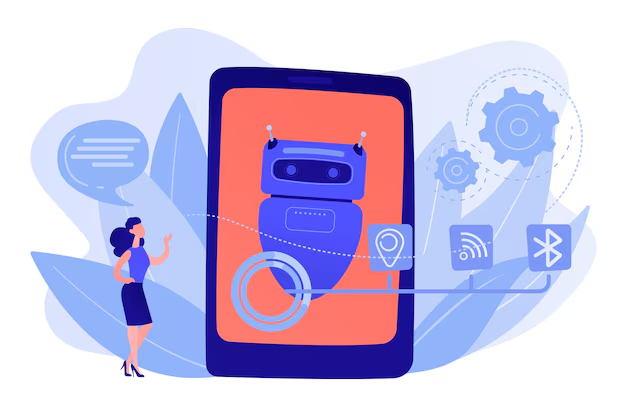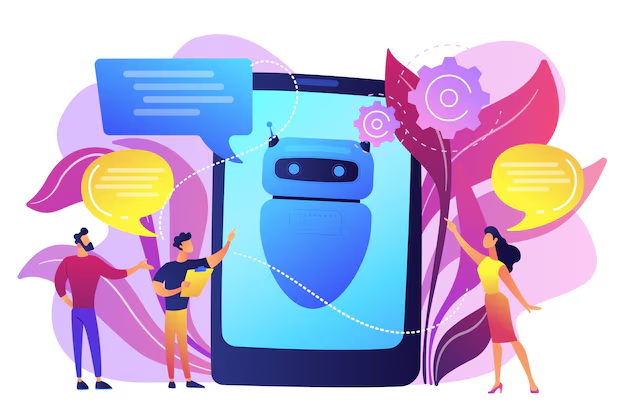In recent years, Artificial Intelligence (AI) has evolved from a niche technology to a mainstream driver of transformation in business. Across industries, AI is reshaping the way companies operate, engage with customers, make decisions, and scale. From automating routine tasks to providing deep insights into consumer behavior, AI is revolutionizing business operations, creating new revenue streams, and giving companies a competitive edge in an increasingly data-driven world. As AI continues to advance, its potential to transform businesses is only set to grow, ushering in new opportunities for innovation, efficiency, and growth.
1. The Role of AI in Business: A Snapshot of the Current Landscape
Artificial Intelligence encompasses a broad spectrum of technologies, including machine learning (ML), natural language processing (NLP), robotics, and computer vision. In business, these technologies are used to analyze vast amounts of data, automate processes, improve customer experiences, and make smarter decisions.
A recent study by McKinsey revealed that nearly 70% of businesses have already adopted at least one form of AI in their operations, with many investing further in AI to drive innovation. The global AI market is expected to reach $1.8 trillion by 2030, reflecting its growing importance across various sectors, including finance, healthcare, retail, logistics, and manufacturing.
From AI-powered chatbots enhancing customer service to AI-driven analytics informing strategic decisions, businesses are leveraging these tools to solve complex problems and streamline their operations. Below, we explore how AI is transforming key aspects of business.
2. Automating Routine Tasks: Boosting Efficiency and Reducing Costs
One of the most significant impacts of AI in business is its ability to automate routine and repetitive tasks, freeing up human employees for more strategic work. Automation through AI is helping businesses achieve higher operational efficiency, reduce labor costs, and improve accuracy.
In customer service, AI-powered chatbots and virtual assistants are now commonplace, answering customer inquiries, processing orders, and handling simple issues 24/7. For example, AI-driven systems like chatbots, which use natural language processing, can interact with customers in real-time, providing instant solutions to FAQs, tracking orders, or even guiding them through troubleshooting. This not only reduces the workload on customer support teams but also improves response times, leading to better customer experiences.
In addition to customer service, AI is being used to automate back-office tasks such as invoicing, payroll processing, and even recruitment. Robotic Process Automation (RPA) leverages AI to handle these administrative tasks, enabling businesses to operate more efficiently. By automating repetitive processes, companies can save time and money, reduce human error, and increase scalability.
3. Enhancing Decision-Making with AI-Powered Analytics
AI has become a critical tool for businesses seeking to leverage data for better decision-making. With the explosion of data generated by customers, operations, and market trends, businesses are finding it increasingly challenging to analyze and extract actionable insights. This is where AI-powered analytics comes in.
AI algorithms can process vast amounts of data in real time, identifying patterns and correlations that would be nearly impossible for humans to detect. By leveraging machine learning, businesses can make data-driven decisions, whether predicting future trends, optimizing inventory, or identifying new market opportunities.
For example, AI can be used to predict customer behavior, allowing businesses to anticipate demand fluctuations and adjust marketing strategies accordingly. In the retail sector, AI is often used to personalize recommendations, suggesting products to customers based on their browsing and purchasing history. Similarly, predictive analytics can be used in the finance industry to detect trends and identify investment opportunities with higher returns.
By making smarter, data-driven decisions, businesses are improving their agility, forecasting accuracy, and overall competitiveness.
4. Personalized Customer Experiences: Building Stronger Relationships
In today’s highly competitive market, personalized customer experiences have become a key differentiator. Consumers now expect brands to understand their preferences and offer tailored products, services, and communications. AI is enabling businesses to provide the level of personalization that customers demand, driving customer loyalty and improving engagement.
Machine learning and AI-powered recommendation systems are already being used to personalize online shopping experiences. For instance, e-commerce platforms like Amazon use AI to recommend products based on past purchases, browsing behavior, and even customer reviews. Similarly, in the entertainment industry, streaming platforms like Netflix and Spotify use AI algorithms to suggest movies, shows, and music tailored to an individual’s tastes.
Beyond product recommendations, AI also helps personalize marketing efforts. AI tools can analyze customer data, segment audiences, and create highly targeted ad campaigns that resonate with specific consumer groups. This means that businesses can move away from one-size-fits-all marketing and engage in more relevant, effective communication.
Moreover, AI is improving personalization in customer service. Virtual assistants can recognize returning customers, personalize interactions, and even remember previous interactions, making customers feel valued and understood. This personalized approach not only improves customer satisfaction but also drives long-term brand loyalty.
5. Enhancing Supply Chain and Inventory Management
AI has the power to optimize various aspects of the supply chain, from demand forecasting to inventory management. One of the key benefits is its ability to predict demand more accurately by analyzing patterns in consumer behavior, historical sales data, and even external factors like weather, holidays, or global events.
For example, AI can help retailers predict which products will be in demand and when, allowing them to optimize stock levels and reduce overstocking or stockouts. This minimizes the need for large inventories, reducing costs associated with warehousing and waste. In industries like food and beverage, where freshness is crucial, AI-powered solutions can help ensure that stock is replenished just in time for demand, reducing spoilage.
In logistics, AI is also improving the efficiency of route planning and delivery optimization. Machine learning algorithms can analyze traffic data, weather patterns, and historical delivery times to create the most efficient delivery routes, reducing costs and delivery times.
By improving supply chain efficiency, AI enables businesses to operate more sustainably, reduce waste, and enhance the customer experience with faster, more reliable deliveries.
6. Empowering Marketing with AI-Powered Tools
Marketing is one of the areas where AI has made a dramatic impact, providing businesses with tools to optimize campaigns, enhance customer targeting, and analyze market trends in real time. AI is helping businesses create more effective marketing strategies, enabling them to reach the right audience with the right message at the right time.
One major area where AI is being leveraged is in customer segmentation. Traditional marketing campaigns often used broad demographic segments, but AI can analyze customer behavior and psychographics to create much more granular, targeted segments. For example, AI can analyze purchasing patterns, website clicks, social media activity, and other customer data to develop highly personalized marketing messages and offers that resonate with specific segments.
AI is also enabling businesses to run more efficient advertising campaigns. Platforms like Google and Facebook leverage AI to automatically optimize ad placement, bidding strategies, and targeting. AI tools can monitor the performance of ads in real time, adjusting tactics as needed to ensure the best return on investment (ROI).
Moreover, AI-powered content creation tools are emerging as valuable assets for marketing teams. Natural language generation (NLG) tools are capable of creating personalized content, such as product descriptions or social media posts, based on customer data, while AI can analyze engagement metrics to refine content strategies.
7. Improving Risk Management and Fraud Detection
Risk management is a critical aspect of business, particularly in industries such as finance, insurance, and e-commerce, where fraud and financial risks are prevalent. AI is playing an increasingly important role in detecting and preventing fraud by analyzing transaction data and identifying unusual patterns or suspicious activities.
Machine learning algorithms are capable of learning from historical data and continuously improving their ability to detect fraud in real time. For example, AI can flag credit card transactions that deviate from a customer’s typical spending behavior, such as large purchases from a new location or unusual transactions at odd hours. Similarly, AI is being used in cybersecurity to detect and respond to potential threats, such as data breaches or hacking attempts.
In the insurance industry, AI is being used to assess risk more accurately, automate claims processing, and improve underwriting efficiency. By using machine learning algorithms to analyze vast amounts of data, insurers can offer more personalized pricing, reducing the risk of underwriting errors and fraud.
8. The Future of AI in Business: Challenges and Opportunities
As AI continues to evolve, businesses will encounter both challenges and opportunities. On the one hand, the rapid pace of AI advancements presents significant opportunities for innovation, operational efficiency, and customer experience. On the other hand, the adoption of AI also raises ethical and regulatory concerns, particularly around data privacy, algorithmic bias, and job displacement.
To fully realize the benefits of AI, businesses must ensure that they invest in the right infrastructure, talent, and governance frameworks. Additionally, they must prioritize transparency and fairness in their AI systems to build trust with customers and stakeholders.
As AI technology matures, its applications in business will only expand, opening new avenues for growth and transformation. The companies that successfully harness AI will gain a competitive advantage, better position themselves in the market, and create value for their customers, employees, and shareholders.
Conclusion: Navigating the AI-Powered Future of Business
AI-powered transformation is no longer a distant vision but a present reality. From automating processes to making smarter decisions and enhancing customer experiences, AI is reshaping how businesses operate, compete, and grow. As organizations embrace AI and integrate it into their operations, they will unlock new levels of efficiency, innovation, and value creation.
The future of AI in business promises endless possibilities, but it also requires thoughtful planning and responsible implementation. By embracing AI technologies, businesses can not only thrive in an increasingly digital world but also contribute to a more innovative, sustainable, and equitable future.





